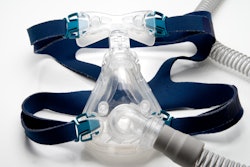
Obstructive sleep apnea (OSA) is linked to cognitive decline, and effective treatment options are needed, according to a study published on May 31 in Sleep Health.
A team from Flinders University in Adelaide, Australia, reported an increased risk of cognitive function decline in patients with OSA, as well as an increased risk of cardiovascular disease, diabetes, anxiety, and depression.
"Non-REM sleep includes light stage 1 and 2 sleep, as well as deeper stage 3 sleep, which is thought to play an important role in learning and memory,” said lead investigator Jesse Parker, PhD (Sleep Health, May 31, 2023).
More than 1 billion people worldwide suffer from OSA, which, if untreated or severe, can boost the risk of dementia and Parkinson’s disease, hypertension, cardiovascular disease, anxiety and depression, reduced quality of life, traffic accidents, and all-cause mortality, Parker and colleagues wrote.
They conducted a study that tracked the sleep patterns of more than 470 men and their daytime cognitive function for processing speed, visual attention, and episodic memory, assessing particular features of brain electrical activity during non-REM sleep called "sleep spindles."
They reported "cross-sectional associations between various domains of next-day cognitive function and several sleep spindle metrics during stage 2 and stage 3 of their sleep cycle and that the "presence and severity of obstructive sleep apnea was an important factor in this relationship."
The link between OSA and cognitive function requires further research, according to the authors.
"Highlighting the need for better treatments, our latest studies not only make more links between sleep disorders and poor health outcomes but also the need for tailored specific treatments for individual cases, including co-occurring conditions such as insomnia and sleep apnoea," they wrote.



















